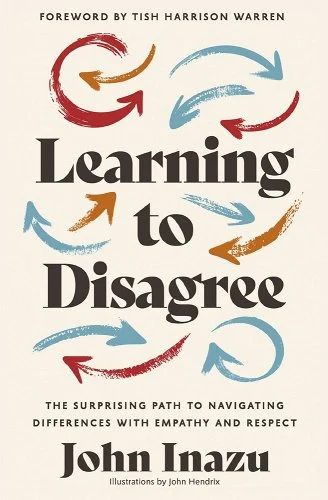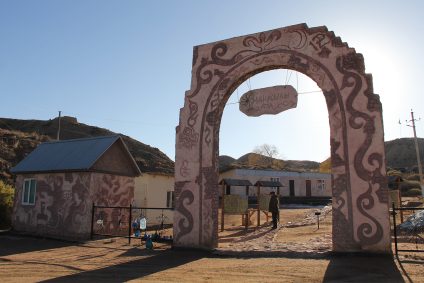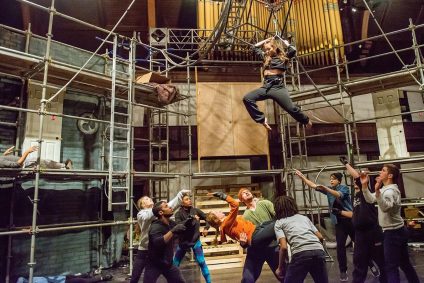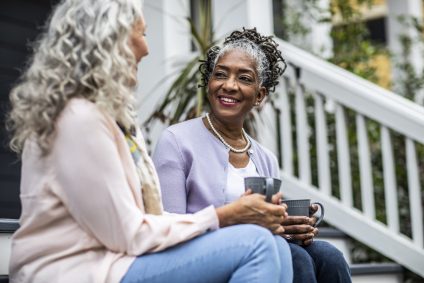John Inazu, the Sally D. Danforth Distinguished Professor of Law and Religion at Washington University in St. Louis, works at the intersection of the freedoms of speech, assembly and religion, and the related legal and political theories. As a civic interfaith leader, he works primarily with evangelical communities in a religiously diverse society to advance pluralism in America.
His latest book, “Learning to Disagree: The Surprising Path to Navigating Differences with Empathy and Respect,” published on April 2, and IA’s Megan Johnson talked with him about the profound impact of forgiveness, teaching law students, and what pluralism can bring to educational spaces.
This interview has been lightly edited for clarity and length.

Megan Johnson: Thanks so much for sitting down with me today to talk about your new book.
In your chapter on forgiveness, you write about visiting Manzanar, the Japanese internment camp where your grandparents were held during World War II. If anyone had cause to withhold forgiveness, it was your grandmother, and yet you write about how she was able to forgive the harm done to her family. This moment in the book got me thinking about how the act of forgiveness is fundamental to the Christian faith, in fact it could be the fundamental act of our tradition. What do you think are the particular resources that Christianity has to offer to help humans learn to disagree better?
John Inazu: That’s a great question. Christian resources, like forgiveness, help us navigate a world that is otherwise full of unaddressable injustices. When you think about the very natural human desire for justice, when a wrong has occurred, it will actually never be met fully in this world. At best, our legal systems and our policy responses can respond to injustice with approximate justice that starts to get to some level of remedy or recompense, but never fully right the wrong. It seems to me that it’s only through forgiveness and related acts that we can move on or forward in the world.
And this is not a uniquely Christian insight. Hannah Arendt and others have written extensively about this as well. But there’s something in our current American cultural context that is particularly indebted to the Christian tradition and Christian resources around forgiveness to the point that I’m not sure how you would discuss or engage in a discourse of forgiveness without Christianity in the United States. So, it seems very important that that’s a resource that Christians can continue to offer.
I think of related ideas like grace and mercy, and how much those concepts have at their best informed and mitigated the harshness of a criminal justice system, or a legal response focused on retribution. And when they’re neglected, we can all see the human toll that those systems can take particularly on the most vulnerable in our society. These ideas of forgiveness, grace, and mercy seem extremely important to our future and our present.
MJ: You tell the story of trying to retrieve a document related to your property boundaries from the County Records Office. You shuffle between multiple lines, are instructed to come back on different days, and are having a difficult time getting the right information. Then, you have a brief encounter with “Ms. J,” who turned your day around. You write, “Sure, everything worked out fine with Ms. J. But what if she hadn’t smiled when she walked up, or what if she had copied one of the pages incorrectly? Ms. J. still would have been the same person I met. But would I have been the same?” I think this is a profound observation and a theological one. Could you talk about what you are observing here, about yourself and about her?
JI: The question I’m asking is whether we can see the people around us as human beings and image bearers of God, and not just problems and interruptions to our day, which is an important predicate to disagreeing well. It’s going to be very hard to disagree well with someone if you don’t recognize their humanity, or if you see them as just an inconvenience to you.
On this day, I had spent a few hours writing this book, and then had to go to the County Records Office and encounter my own frustration. I was processing my own limitations in real time as I was trying to tell other people how they should be thinking about engaging with disagreement and difference. That afternoon, I encountered this woman who really did brighten my day in an unexpected way, in the middle of a process that was frustrating and annoying and not very efficient. The thought experiment I was having with myself was – if she hadn’t been nice to me, would I have responded differently? Would this story have had a happy ending?
It was an invitation to myself to think about the work I still have to do in these situations, and a reminder that in the ordinary course of our days we encounter all kinds of human beings who are all very complex, who are dealing with their own challenges and problems. If we don’t pause to remember that, we’ll go through our days hurting and dismissing a lot of people who could use a little humanity and decency.
C.S. Lewis has this wonderful quote in “The Weight of Glory,” “You have never talked to a mere mortal.” Everybody you encounter is this eternal being with a destiny ahead of them, and you’re pushing them closer or farther away from that destiny depending on the way you engage with them. I love that reminder. I don’t always keep it top of mind, but it’s a really important one.
You have never talked to a mere mortal.
MJ: You tell your law students to find the cases and ideas they think are best, and then force themselves to figure out the best arguments on the other side. Why is this so important for your students? And what does this look like outside of a law school classroom for the rest of us?
JI: The connection between what we do in the law school classroom and how it applies to everyday life is one of the key themes of the book. My intuition is that the work of wrapping your head around the fullness, complexity, and strength of the argument on the other side forces you into an act of empathy, whether you want it to or not.
If you can take the time to think deeply about an argument from the other side, think about why this person made that argument, what resources they drew from, what authorities they considered, and what are the strengths of the points that they’re making – which is what you have to do to be a good lawyer or a good law student – then it’s very difficult, at the end of that process, to come away with the same sense of dismissal that you might have had without having done that work.
I think that lesson is applicable to our everyday interactions at the family dinner table or with a neighbor. And there are ways to practice this. In a conversation with someone, you could ask them, “How did I do? Am I getting your point here?” We will still disagree. But it’s going to leave us with fewer black and white arguments because most of our complex arguments in society involve people of good faith who see the world differently and come to very different views about an important issue or policy.
MJ: You make the point that it’s not wise to jump right into conversations about a controversial topic with someone you just met. Instead, you need time to build a relationship before diving into the hard stuff.
As you know well, that’s the heart of Interfaith America’s model. But it can be challenging to create spaces where people are choosing to reach out and interact with people who think differently than they do in this divisive cultural moment. What advice do you give to students about how to take that first step to try to get to know someone with whom they disagree?
JI: The real opportunity of the college environment is that it allows for so many informal interactions and informal spaces. You need a framework and a culture that promotes authentic dialogue, and that allows people to try things out and make mistakes rather than jump to condemn every malformed statement.
But that’s not going to happen well in a 300-person lecture hall or a public debate. These things are best when they’re in small and sustained groups, whether it’s a small seminar, or a dorm discussion. Part of this is encouraging the right mix of the social and the superficial with the deep and the challenging, so that these relationships can unfold in a larger context, where people are sharing meals, playing games together, and enjoying each other’s presence within an institutional structure rather than simply sitting down to have a hard conversation over an area of difference. That’s not how we function best. The gift of the university is that it has the potential to offer that holistic experience.
MJ: Later in the book, you write, “As with other faith commitments, you will likely find that encouraging greater honesty about different beliefs leads to more authentic relationships.” Can you say more about that? What do you see as the interplay in your mind – and in your experience – between interfaith engagement and the tools and skills required to engage across religious difference, and how you might bridge ideological divides more broadly?
JI: Interfaith engagement done well can be a model for other kinds of engagement across difference, particularly as we are increasingly becoming a country where people’s political identities start to take on religious-like significance. We’ve got a lot of lessons to draw from the interfaith context, where somebody says, “This is not just my belief, or this is not just my viewpoint, but this is so much of who I am and how I see the world, and why I live a certain way.” That’s always been true with a number of different identity characteristics, but I think religion most prominently foregrounds the connection between beliefs and practices, especially related to issues of cosmic significance.
One of the things I love about Interfaith America is that it encourages an authentic engagement that asks people to bring the complete versions of themselves and their beliefs and actions – which is going to result in some stark differences and some similarities with others. It doesn’t gloss over the differences or pretend that they don’t exist.
In our broader society and across a whole number of difficult legal and policy issues over which we disagree, it’s not going to help anyone to pretend like the differences aren’t there, or that they don’t matter. And just like some interfaith efforts of a generation ago didn’t make much inroads into people who actually embodied significant differences, I think that if a cross-ideological effort doesn’t take differences seriously then, it is unlikely to sustain lasting friendships and relationships.
Interfaith engagement done well can be a model for other kinds of engagement across difference.
MJ: What brings you hope these days, and what do you hope people take away from your book?
JI: Hope is a tricky concept. It might be a uniquely theological concept. As a Christian, I have hope in the object of my faith. I want to be careful about naming hope in too many other things. I do have optimism, though, in a lot of other areas.
I have optimism regularly, when I talk to college-age audiences. I see a student population that like all student generations of the past, is passionate, has a lot of energy, is restless, and wants to see change. They have also been raised in a more diverse and pluralistic environment. Some of the discomfort and anxiety that older generations might be feeling with the changing America isn’t as acute to younger generations who are more interested in engaging. They’ve also seen some of the negative lessons of earlier generations, namely that we’re holding on to too much institutional control, and they want to see a different way of engaging in the world. I think this is particularly true in certain Christian circles, where membership in majority culture has been taken for granted by some older generations and the change feels like a loss, but for younger generations change feels like a real opportunity. So I’m optimistic about that.
And I’m optimistic about the local. I’m optimistic about real people who have to work with other real people, not in the social media world but in the real world where things happen in complex and sometimes messy ways. And people want to make that work.
I hope the book is encouraging, but also practical. I wrote it with the goal of having people read it and discuss it with others. It’s not a how-to guide; it’s not a “here are 10 steps to better disagreement,” but I’m trying to model a kind of thinking and a way of reading that might lead people to a different kind of action. It’s only that action over time, in community, within institutions, that will actually change people’s behavior. So there’s nothing that a single book or a single talk is going to do, but if people can begin to see things differently and try to practice those new ways of seeing things, then that would be a great first step.
Megan Johnson is the Senior Director of Strategic Initiatives.
Latest Articles
-

American Civic Life
Once Protected by its Remoteness, a Sacred Lake in Kyrgyzstan is Threatened by Change
April 26, 2024
-

-

-

-

Interfaith America Interview
"You Desperately Need Rest," Author Dalton-Smith on Sacred Rest
April 16, 2024
Join us today
Get inspired, equipped, and connected to unlock the potential of America’s religious diversity.